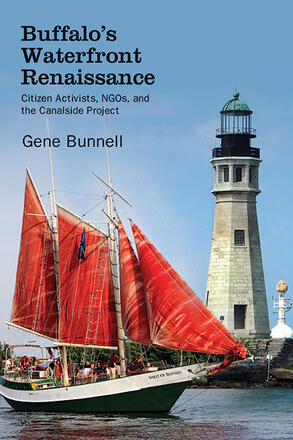
Buffalo's Waterfront Renaissance
Citizen Activists, NGOs, and the Canalside Project
Recounts how preservationists and environmentalists ultimately succeeded in persuading a powerful state agency to abandon its plans for privately developing Buffalo’s waterfront and instead revitalize the city by enhancing opportunities for members of the public to use and enjoy that same space.
Description
This book tells the remarkable story of howBuffalo's post-industrial waterfront was reclaimed for public use and enjoyment and pays tribute to the many local citizens and nongovernmental organizations that made the city’s waterfront renaissance possible. After years of litigation, public controversy and debate, preservationists and environmentalists ultimately succeeded in persuading the state to abandon its contentious plans for privately developing Buffalo's waterfront. Gene Bunnell, an experienced urban planner, lays out the Buffalo waterfront's long and troubled history, from the torrent of shipping and commercial activity that was unleashed by the opening of the Erie Canal, to the contamination of the Buffalo River due to waterside industries, to how the Outer Harbor—the last portion of the waterfront to be industrially developed—was reshaped and contaminated by filling in low-lying areas with a toxic mix of waste materials. Drawing on interviews and articles, editorials, and op-eds from The Buffalo News, Bunnell provides the reader with a "real-time" sense of how the struggle over the future of Buffalo's waterfront unfolded and the ultimate victory by local activists to secure environmental cleanup, restored natural habitats, and expanded public waterfront access.
Gene Bunnell is Emeritus Professor of Geography and Urban Planning at the the University at Albany, State University of New York. He is the author of Built to Last: A Handbook on Recycling Old Buildings and Making Places Special: Stories of Real Places Made Better by Planning.
Reviews
"Gene Bunnell's book is an invaluable and well-written examination of the history of Buffalo's waterfront and of the many ups and downs of its redevelopment in recent decades. As someone deeply interested in the role of local journalism in American democracy, I especially appreciated how he adroitly shows the positive role that The Buffalo News played in persuading—at times pressuring—the state waterfront agency to scrap its original redevelopment plans in favor of ones that ultimately better served the public. His research is meticulous, his writing is accessible, and his message is important." — Margaret Sullivan, former editor of The Buffalo News and columnist for the Guardian (US)
"Buffalo's Waterfront Renaissance is an outstanding piece of scholarship. Reading the manuscript deepened my love for the Queen City. I thoroughly enjoyed reading it. In fact, I went through it in two uninterrupted afternoons. That is highly unusual for me. The many examples of how individuals created NGOs hopefully encourages others to follow their lead." — Claude E. Welch, Jr., SUNY Distinguished Service Professor Emeritus, Comparative Politics, Department of Political Science, University of Buffalo, the State University of New York
"Bunnell's interesting and useful case study should appeal to planners, developers, and citizens in equal measure. General readers will especially appreciate his particular focus on citizen participation and intervention in planning processes generally left to politicians and professionals." — Jonathon Welch, owner, Talking Leaves...Books, Buffalo, New York
"Buffalo's Waterfront Renaissance is a unique and insightful study of a waterfront district undergoing de-industrialization and the struggle between citizens and their public organizations with state government and experts, ultimately leading to the area's ecological and cultural renewal. Today, Canalside is a place where all feel welcome and comfortable." — Clinton E. Brown, FAIA, coauthor of Olmsted’s Elmwood: The Rise, Decline and Renewal of Buffalo's Parkway Neighborhood